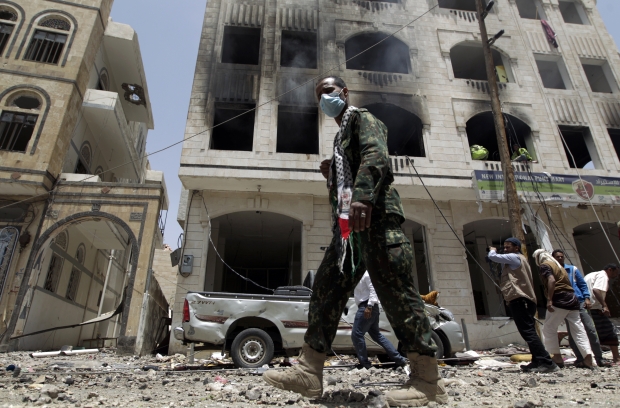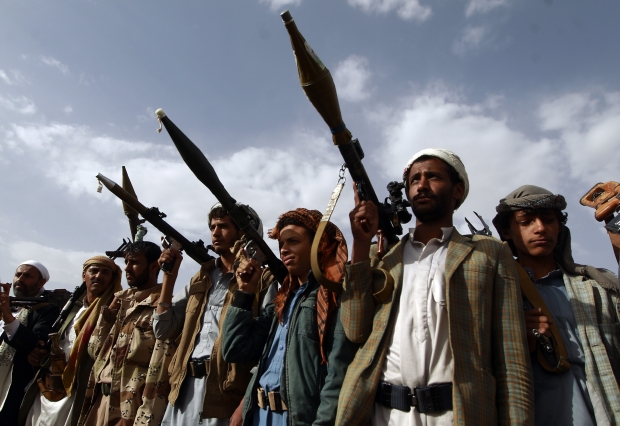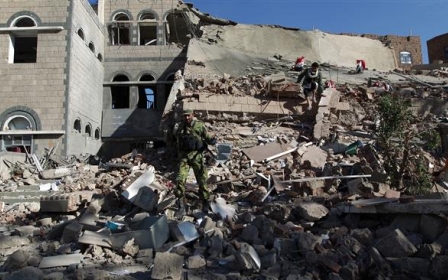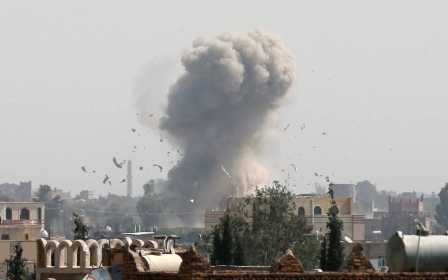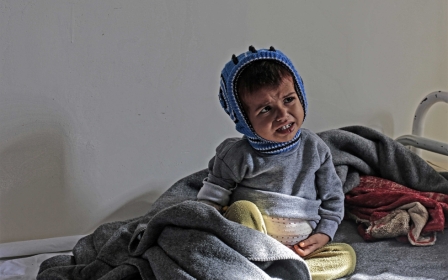Saudi arms sales must end, UK parliamentary report says
Britain should suspend all arms sales to Saudi Arabia until an independent UN team can fully investigate allegations of human rights violations in the war in Yemen, according to a hard-hitting parliamentary report that questions the motivations of the British government and its defence of continued sales.
The Thursday report by the business, innovation and skills and international development committees states that it is "inevitable" that UK-made weapons have been used in Yemen, given the British defence industry’s long ties to Riyadh.
Saudi Arabia has been accused of indiscriminate attacks on civilians in Yemen, including air strike on hospitals, residential areas and factories, during its war against the Houthi movement that began in March 2015.
The report criticises the government's reliance on a Saudi-commissioned inquiry earlier this year into alleged abuses in the Yemen war that concluded there had been "no serious" breaches of international humanitarian law.
Earlier this month, the foreign secretary, Boris Johnson, defended weapons sales to Riyadh in a written statement to MPs indicating there had been no "serious breach", which was the "key test" on deciding whether sales should continue.
The joint-committee report disagreed.
It said a report prepared for the UN Security Council by the panel of experts on Yemen in January identified potential violations in 119 Saudi-led coalition air attacks.
"The panel documented that the coalition had conducted air strikes targeting civilians and civilian objects... including camps for internally displaced persons and refugees; civilian gatherings, including weddings; civilian vehicles, including buses; civilian residential areas; medical facilities; schools; mosques; markets, factories and food storage warehouses."
"The panel further noted the coalition’s designation of the entire city of Saada and region of Maran as military targets, confirming that 'entire cities or governorates cannot be considered military targets, even with attempts to provide advance warning'."
The parliamentary inquiry took evidence from groups including Human Rights Watch and Amnesty International, who documented a case in September 2015 in which the remnants of a British-supplied cruise missile had been identified from a strike on a Yemeni ceramics factory.
It cited evidence given by David Mepham, HRW's UK director: "I was at a meeting with [the foreign secretary] several months ago when I gave him copies of our report and said, 'These are the GPS coordinates; these are the strikes; these are the markets and schools that were hit. Therefore, he has that evidence. The foreign office has had that evidence for months. It is extraordinary that the line comes back that they do not have evidence.'"
The report also said that it had been noted by numerous sources that the British government frequently cited Human Rights Watch and Amnesty International evidence in other conflicts, such as Syria, but in Yemen, it appeared to rely on assurances from the Saudi authorities.
"In her written evidence to us, Dr Anna Stavrianakis of the University of Sussex states: 'The UK government is thus currently both refusing to respond to published, documented evidence provided by independent experts; and relying on secret claims provided by the Saudi military. This creates an information black hole that makes it impossible for... independent observers to properly assess UK government policy and hold it to account.'"
It noted that a British-made BL-755 cluster munitions had been used on farmland in northern Yemen. The weapon was sold to Saudi Arabia in the 1990s before a convention banning their use came into force. The UK is a signatory, while Saudi Arabia is not.
In conclusion, the report said: "HM Government appears to have relied on assurances from the Saudi government that the coalition is operating within the boundaries of international law, despite the fact we heard evidence from credible sources to the contrary.
"Given that the UK has a long history of defence exports to Saudi Arabia and its coalition partners, and considering the evidence we have heard, it seems inevitable that any violations of international humanitarian and human rights law by the coalition have involved arms supplied from the UK.
"HM Government has obligations under the Arms Trade Treaty, as well as European and domestic law, to ensure there is no risk that arms it has licensed might be used in contravention of international humanitarian law."
It noted that Saudi Arabia was "one of our closest allies".
"However, the weight of evidence of violations of IHL (international humanitarian law) by the Saudi-led coalition in Yemen is now so great that it is very difficult to continue to support Saudi Arabia while maintaining the credibility of our arms licensing regime.
"In the case of Yemen, it is clear to us that the arms export licensing regime has not worked. We recommend that the UK suspend licences for arms exports to Saudi Arabia, capable of being used in Yemen, pending the results of an independent, United Nations-led inquiry into reports of violations of IHL, and issue no further licences.
"We therefore recommend that HM Government suspend sales of arms which could be used in Yemen to Saudi Arabia until the independent, UN-led investigation has come to its conclusions and then review the situation again."
Stephen Twigg, the chairman of the international development committee, said: “We remain unconvinced that Saudi Arabia is the best placed to investigate reports of breaches of humanitarian law – progress so far has been too slow.
“It is important to remember that both sides to the conflict are potentially involved in breaches of humanitarian law and without credible investigations, neither side is being held accountable for their actions.
“The current UN Human Rights Council is an excellent opportunity for the UK government to make a serious call for independent UN-led investigation into what has happened.
“Arms trade law is very clear that licences should not be granted where there is a clear risk that they might be used in a serious violation of IHL. It is hard to understand how a reliable licence assessment process would not have concluded that there is a clear risk of misuse of at least some arms exports to Saudi Arabia."
Parts of the committee report were leaked to the BBC last week, a day before the Saudi foreign minister, Adel al-Jubeir, held private talks with MPs in London in what was described by arms industry opponents as a lobbying exercise.
MPs then discussed the report's content during a closed session of the arms control select committee.
Publication was delayed when Conservative MP Crispin Blunt reportedly walked out of the meeting. Blunt is said to be preparing an "alternative" report under his stewardship of the foreign affairs select committee.
The Campaign Against the Arms Trade won a judicial review against the government into the continued sale of weapons to the Saudi government, which is due to be heard in February.
CAAT says that the British government has sold $3.7bn of weapons to Saudi Arabia since it entered the war 18 months ago in support of Yemen President Abd Rabbuh Hadi.
The UN said earlier this month that 10,000 people have been killed in the war in Yemen.
New MEE newsletter: Jerusalem Dispatch
Sign up to get the latest insights and analysis on Israel-Palestine, alongside Turkey Unpacked and other MEE newsletters
Middle East Eye delivers independent and unrivalled coverage and analysis of the Middle East, North Africa and beyond. To learn more about republishing this content and the associated fees, please fill out this form. More about MEE can be found here.


